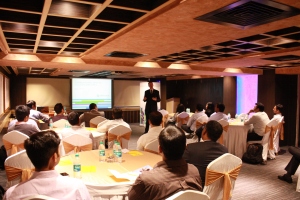- March 2, 2014
- Posted by:
- Category:Bengaluru, BLOG, Events, Speaker Events
Invited by the Indian Association of Investment Professional (IAIP) Bengaluru chapter, Richard McGillivray, Director, Industry Relations, Asia Pacific, CFA Institute, spoke at length on the intricacies in acquiring, managing and retaining ultra-high networth (UNHW) individuals and family office investors on February 19th.
Sharing a wealth of experience in the field of bringing American and European UNHW individuals and family office investors to invest in Asian hedge funds, McGillivray first touched upon the importance of fiduciary duty. He dwelled upon the fact of how young fund managers, surrounded with sudden explosive wealth become victims of their own hubris. It is often forgotten that managing a client’s money is a privilege for the fund manager and is not to be taken lightly. Strong indicators of poor fiduciary responsibility would be indicated by presence of lock-ups, front loaded fees, short crystallization periods and no benchmarks among others.
McGillivray said that acquiring clients would not necessarily translate into assets under management. Especially in family offices, where trust is key, clients will initially give you very small amounts of money to manage and it takes considerable time before they begin to buy into you. However when buy-in happens, asset growth can be explosive. In other words, one must be patient and nurture client relationships before genuine asset accumulation can take place.
Talking about how bear markets provide phenomenal opportunities to build trust, McGillivray spoke from a personal example where a Japanese hedge fund saw its value drop from $3 billion to $300 million. He said in such times communication and honesty is key. When a material negative event has happened within the fund, however painful it is, it is far better to straight away pick up the phone and speak to your clients rather than to wait for the month end when they see the official communication. Most family offices he said are mature and understand the risks involved, however what they detest is double speak and sleight of hand. In bear markets when clients begin to see that you are upfront and honest, a bond of trust is built. Bull markets do not provide this opportunity, as clients expect performance since the market has anyway performed.
Clients often ask to meet the fund manager in person. A fund manager’s time however is limited and must be used productively in managing the fund rather than talking to clients. In such cases, those in client facing roles must bring the client upto speed on all aspects of the fund and ensure time spent with the portfolio manager is only for those questions which remain unanswered. To manage client expectations it may be a good idea to have specific time slots, when the portfolio manager can make himself available for client discussions.
On a parting note, McGillivray said that about 1000 firms manage $25 trillion in assets. This provides a huge opportunity as family offices seek boutique hedge funds to manage their money and stay away from mutual funds. Family offices tend to be sticky clients as their perspective is not return but intergenerational wealth preservation and growth over the long haul. Acquiring even one family office client can spread the word about the fund. Family offices can however raise sharp questions and at all times it is critical to never allow your ego to come in the way. Keep a cool head, be truthful and acknowledge when you do not know the answers to the questions that are raised.
Specifically on India, McGillivray said there are interesting opportunities for Indian hedge fund managers. India is looked upon as an unexplored market that many American, European and Australian family offices would like to participate in. Indian fund managers would however need to overcome a perception that they promise too much and many a time under deliver.
– V P



















